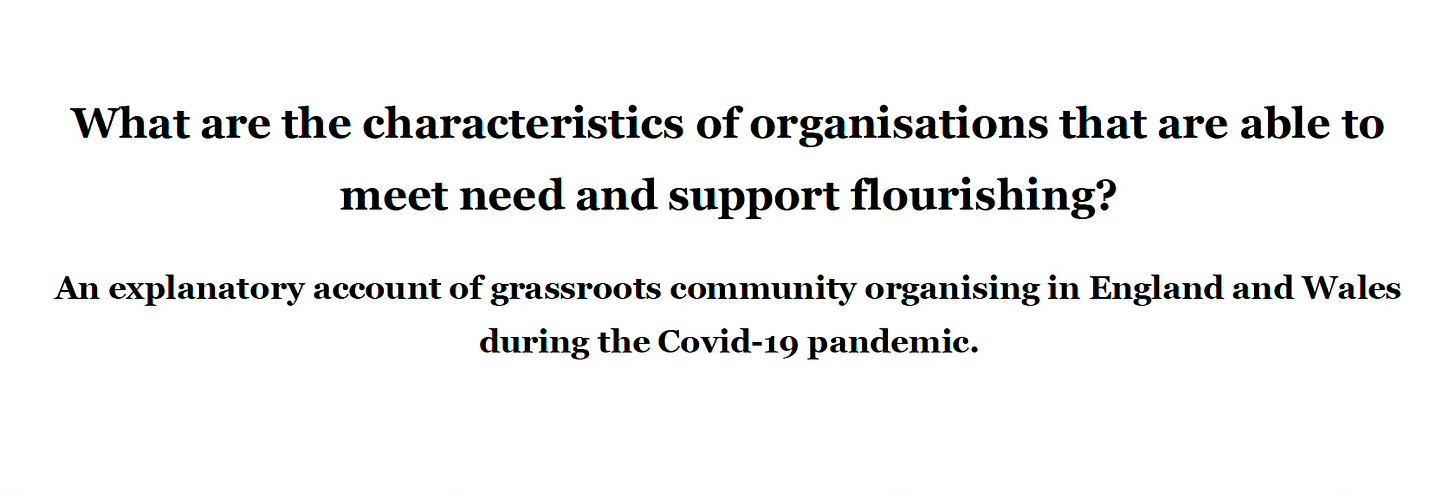Grassroots community organising during the pandemic
Why were grassroots community organisations so effective at meeting people's needs in lockdown?
I am totally delighted to say that I have passed my PhD viva without corrections and my final thesis has been deposited.
It's been a life changing and amazing experience but I'm very glad it's over!
My thesis is an explanatory account of the grassroots community response to the Covid-19 pandemic in England and Wales, and asks the question 'What are the characteristics of organisations that are able to meet need and support flourishing?'
I’ll be publishing a report and articles about it all, but for now I thought I would share a bit about what I found out.
I found that grassroots community organisations did a lot of important work to make sure people had their needs met during the early months of the pandemic, and were better able to respond to the crisis than many larger organisations. The reason grassroots community organisations were so effective at meeting need during lockdown was because they acted fast and in ways that addressed the specific needs of different people and communities (rather than using one-size-fits-all models that are slow to change). This type of response was made possible when organisations had a relatively flat management structures with minimisation of hierarchy. This allowed them to make use of the important knowledge of those working on the 'frontline', and it meant they didn't have to involve lots of layers of management in decision-making. It was also important that organisations trusted their frontline workers enough to allow them to make on-the-spot decisions about how to meet particular and changing needs, rather than being confined to very rigid procedures. This required that those doing frontline work had sufficient knowledge and skills to enable them to use their judgment in real-life situations.
In order to respond effectively to people's needs, grassroots community organisations had to have enough resources. Where communities did not have enough money and other resources, this was a barrier to being able to meet people's needs (even if they could see the gaps and knew what would be needed to fill them). Meanwhile, when organisations were funded through commissioning or through selling of services, this could put them in a position of being forced to choose between acting in ways that would generate enough income and acting in ways that met needs in their communities.
Finally, I found that involvement in grassroots community organisations helped to meet the needs of those who did the work of making things happen. Being part of a grassroots group or small charity helped people to feel a sense of belonging and to feel that they had something of value to offer. However, in some cases, people were also depleted by their work for grassroots organisations, and sometimes felt overburdened, burned out or undervalued. It is therefore important that those who are providing support for others in one setting are themselves offered support in another setting. I suggest that a web of grassroots community organisations, offering different types of activity and support to different people, can help to achieve this.
I finish the thesis by thinking about what kinds of social and economic policies might help to support such a web of caring grassroots organisations. Universal Basic Income has the potential to free up more of people’s time so that there is more flexibility in society for doing things because they are useful and meaningful (rather than because they pay wages). A shorter working week, combined with higher minimum wage, would also help create more time in people’s lives for grassroots community activity. Finally, a generous and flexible grant programme, aimed at funding activity that communities themselves believe is needed (rather than imposing state-driven ‘outcomes’), could help provide much-needed resources to allow grassroots groups to meet the specific and changing needs of their own communities.


